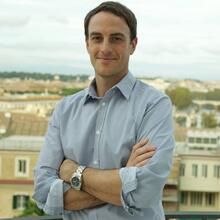A Reflection for Thursday of the Ninth Week in Ordinary Time
You can find today’s readings here.
One of the scribes came to Jesus and asked him, "Which is the first of all the commandments?” (Mk 12:28)
Wait, wait. Don’t tell me. I know this one. It’s: Love the Lord your God with all your heart, with all your soul, with all your mind and with all your strength. Correct! Well, sort of. “The second is this: You shall love your neighbor as yourself” (Mk 12:31). So, there are two commandments that make up the first, or greatest, commandment? One plus one equals one.
Have you ever noticed this slight mathematical inconsistency in Jesus’ proclamation of the greatest commandment? It’s very trinitarian of him. After all, the Christian faith is built on the central mystery of God being revealed as Father, Son and Holy Spirit. One God, three distinct persons. I see a pattern.
The Trinity is not an abstract concept or mathematical equation. It’s a reality that permeates our faith and our lives.
Chances are, this is the only Scripture reflection you’ll find on the Trinity less than a week after Trinity Sunday! That’s because the Trinity is literally, by definition of the church, a mystery. Preaching or reflecting on it is undoubtedly a daunting task. In my experience as a weekly Massgoer, very few preachers effectively tackle “The Trinity.” Often, a homily on Trinity Sunday can feel like, “Let’s just get through it, forget about it and move on.” (Side note: We just launched a new podcast that unpacks great Catholic preaching! Be sure to follow the podcast on Apple, Spotify or your podcast app.)
We seem to avoid thinking about the Trinity because it doesn’t add up; we don’t and can’t totally understand it. That’s natural, but maybe it’s the wrong approach. The Trinity is not an abstract concept or mathematical equation. It’s a reality that permeates our faith and our lives. Rather than fear the mystery, we should try to recognize the trinitarian patterns all around us and embrace them. In today’s Gospel, Jesus is encouraging us to be trinitarian. He wants us to embrace the reality that love of God and love of neighbor are inseparable, not because it’s logical, but because it’s true.








